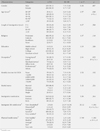Abstract
Purpose
The objective of this study was to investigate the degree of depression in Korean American immigrants according to their characteristics.
Methods
This descriptive correlation study conducted visit-surveys with organized questionnaires and sampled 330 Korean American immigrants living in Houston, Seattle and New York areas. SCL-90 was used to measure the degree of depression. Data was analyzed by t-tests, ANOVA, Pearson's correlation coefficients and multiple regression analysis using SPSS/WIN 14.0.
Results
Findings revealed that; 1) the degree of depression in Korean American immigrants according to their characteristics were significantly different in age, occupation, immigration life satisfaction, and health status; 2) Pearson's correlation revealed a significant association among depression, immigrant life stress, self esteem, and quality of life; 3) multi regression analysis showed immigrant life stress, self esteem, and quality of life significantly influenced depression in Korean American immigrants.
Figures and Tables
References
1. Ahn HR. The experience of Korean-American women's acculturative stress. J Korean Acad Psychiatr Ment Health Nurs. 2007; 16(2):160–173.
2. Campbell A. The sense of well-being in America: Recent patterns and trends. New York: Mcgraw-hill;1981.
3. Choi YH. The comparative study on health-promoting behavior, life satisfaction and self-esteem between Korean elderly and American-Korean elderly. J Korean Community Nurs. 2003; 14(4):667–675.
4. Cohen J. Statistical power analysis for the behavioral sciences. 2nd ed. Hillsdale, New York: Lawrence Erlbaum;1988.
5. Derogatis LR, Govi L. The SCL-90: An out-patient psychiatric rating scale preliminary report. Psychopharmacol Bull. 1973; 9:13–27.
6. Han SS, Kim KM. Influencing factors on self-esteem in adolescents. J Korean Acad Nurs. 2006; 36(1):37–44.

7. Heilemann M, Frutos L, Lee K, Kury FS. Protective strength factors, resources, and risks in relation to depressive symptoms among childbearing women of Mexican descent. Health Care Women Int. 2004; 25(1):88–106.

8. Hoschl C, Ruiz P, Casas M, Musalek M, Gaebel W, Vavrusova L. The impact of migration on mental health and mental illness. Eur Psychiatry. 2008; 23:S42.

9. Hurh WM, Kim KC. Correlates of Korean immigrants mental health. J Nerv Ment Dis. 1990; 178(11):703–711.

10. Jeon BJ. Self-esteem: A test of its measurability. Seoul: Yonsei University;1974. Unpublished doctoral dissertation.
11. Jeon EY, Kim SY, Kim KB. Analysis of depression and health status in Korean-American elderly. J Korean Gerontol Nurs. 2005; 7(2):157–165.
12. Kim HS. Cultural identity, acculturation, and mental health of immigrant youths - review study for Canada's immigrant youth population. J Korean Acad Psychiatr Ment Health Nurs. 2006; 15(4):384–391.
13. Kim JS, Shin KR. A Study on depression, stress, and social support in adult women. J Korean Acad Nurs. 2004; 34(2):352–361.

14. Kim KI, Kim JH, Won HT. Korean Manual of Symptom Checklist-90-Revision. Seoul: Chung Ang Juk-Sung Publisher;1984.
15. Kim MT, Han HR, Shin HS, Kim BK, Lee HB. Factors associated with depression experience of immigrant populations: A study of Korean immigrants. Arch Psychiatr Nurs. 2005; 19(5):217–225.

16. Kim MT. Cultural influences on depression in KoreanAmericans. J Psychosoc Nurs Ment Health Serv. 1995; 33(2):13–18.

17. Kogan HN, Betrus PA. Self-management: A nursing mode of therapeutic influence. ANS Adv Nurs Sci. 1984; 6(4):55–73.

18. Kuo WH. The prevalence of depression among Asian Americans. J Nerv Ment Dis. 1984; 172:449–457.
19. Lee ES. Health care status of first generation Korean immigrants in New Zealand. J Korean Acad Nurs. 1999; 29(1):183–195.

20. Lee MS. Workers' subjective quality of life and influencing factors. Seoul: Yonsei University;1998. Unpublished doctoral dissertation.
21. Lee SW. Correlation study between stress responses and life events as a stressor. J Nurs Acad Soc. 1993; 23(2):299–305.

22. Ministry of Foreign Affairs and Trade. Migration Statistics. 2007. 12. 30. Retrieved March 20, 2008. from http://www.mofat. go.kr/me/index.jsp.
23. National Institutes of Mental Health. Depression. 2000. Retrieved August 9, 2006. from http://www.nimh.nih.gov/publicat/depression.cfm.
24. Oei TP, Kwon SM. Evaluation of the integrated cognitive model of depression and its specificity in a migrant population. Depress Anxiety. 2007; 24:112–113.

25. Oh SH, Park GH. Factors affecting immigrant's psychological health. Korean J Soc Pers Psychol. 2007; 21(4):55–69.
26. Park SY, Bernstein KS. Depression and Korean American immigrants. Arch Psychiatr Nurs. 2008; 22(1):12–19.

27. Rosenberg M. Society and the adolescent self-image. New Jersey: Princeton University Press;1965.
28. Selwood A, Thorgrimsen L, Orrell M. Quality of life in dementia: A one year follow up study. Int J Geriatr Psychiatry. 2005; 20:232–237.
29. Sin KL. The correlates of depressive symptomatology in Korean-American women in the U.S. Womens Study Rev. 1995; 12:205–242.
30. Yoon IJ. Korean immigration to the United States and intergenerational conflicts in Korean immigrant families. Stud Korean Abroad. 2000; 9:5–44.




 PDF
PDF ePub
ePub Citation
Citation Print
Print






 XML Download
XML Download